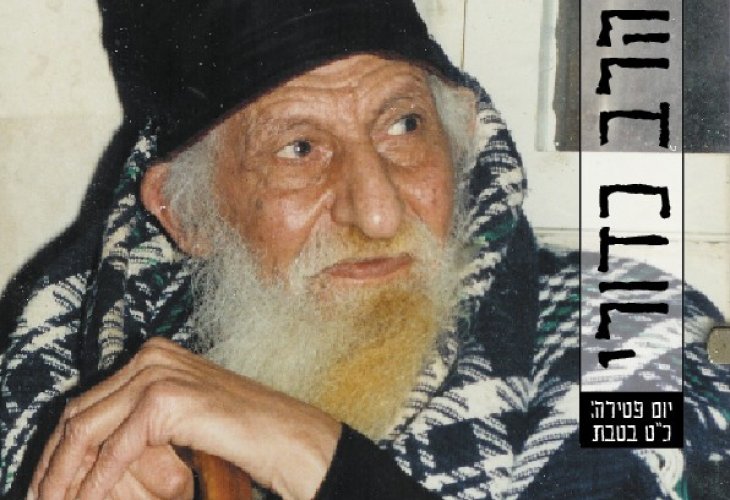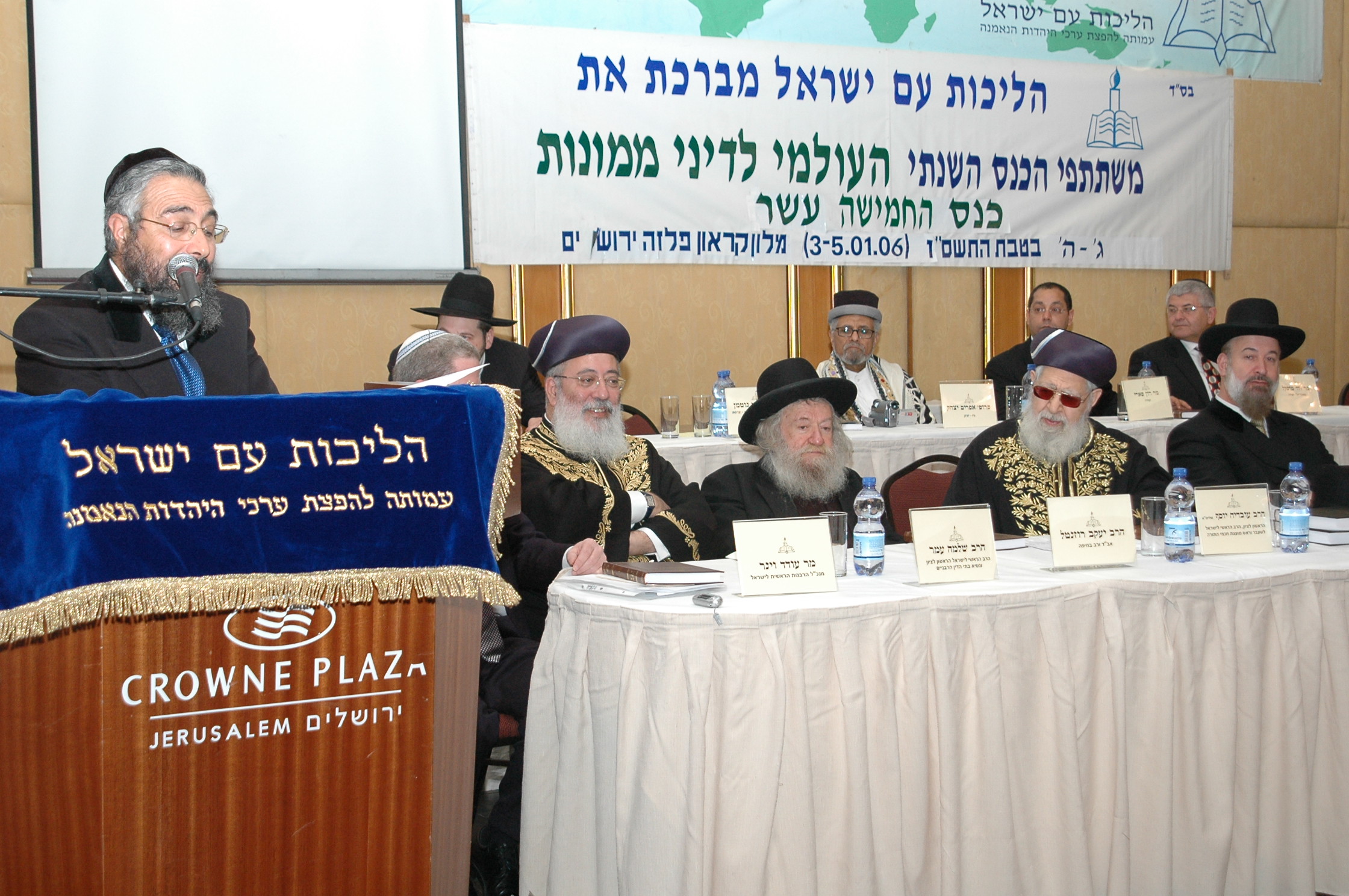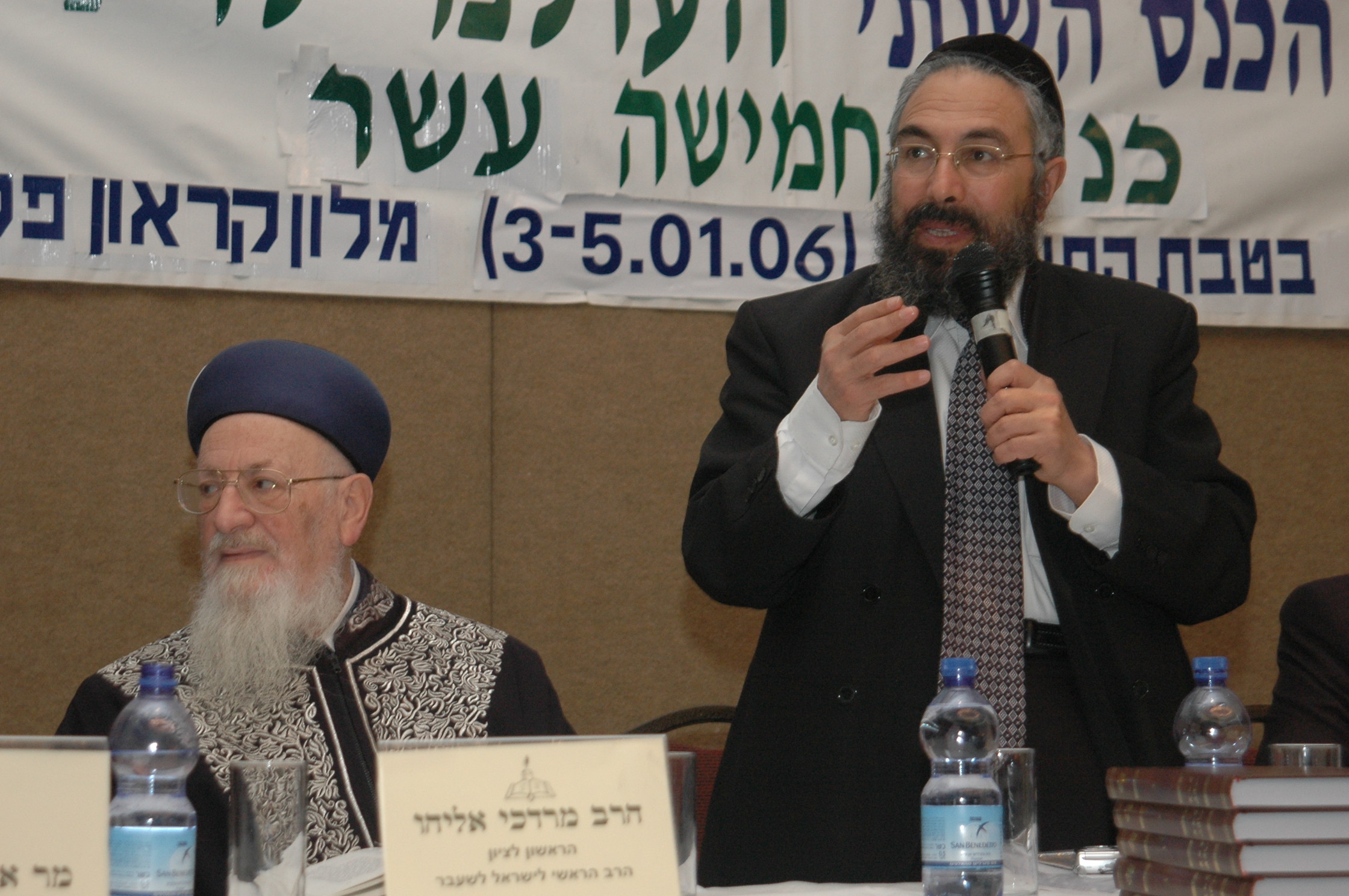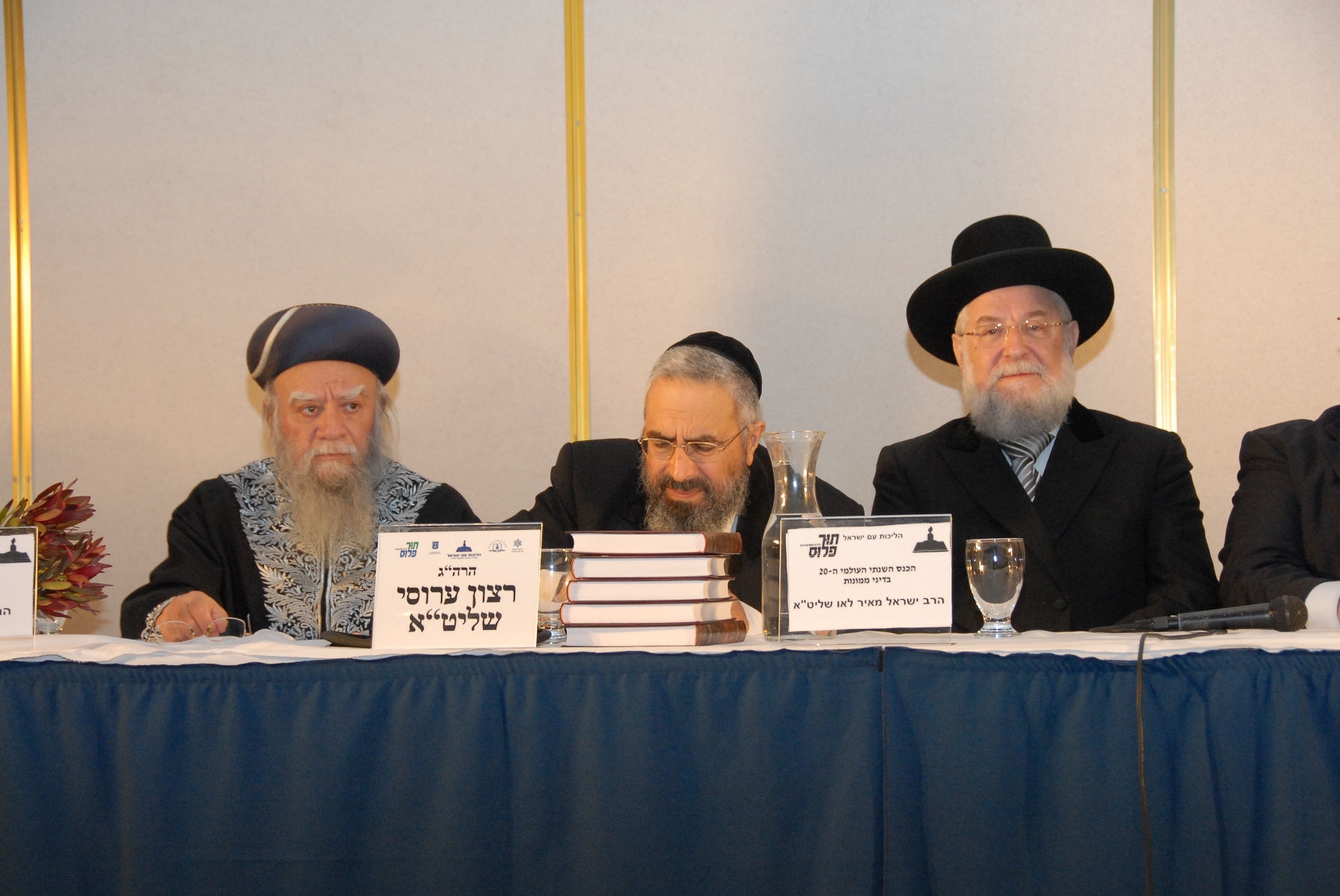"Even Jews Who Do Not Observe the Torah and Commandments Come to Judge at the Rabbinical Court": Rabbi Ratzon Arusi Describes the Revolution
Rabbi Ratzon Arusi witnessed with pain the growing erosion of the Jewish identity of the state through the legal system and laws. Since then, he has worked extensively to promote the recognition of Torah law. A fascinating interview.
 Rabbi Ratzon Arusi (Photo: Sharon Hen)
Rabbi Ratzon Arusi (Photo: Sharon Hen)"During the time I completed my studies," begins Rabbi Ratzon Arusi, "it was decided to separate the halachic definition of a Jew from civil registration, allowing the entry 'Jew' in the identity card even for those whose father is a Jew or who underwent Reform conversion. This decision was, of course, made after intense debates, part of a process initiated by the courts and legal system, eroding the Jewish identity of the people and the state."
The Rabbi, pained by the situation, saw it as a great mission. The beginning of this mission was through an unconventional educational path he chose. "As a young scholar, a Yeshivat Hevron graduate, I wished to study Dayanut at the Harry Fischel Institute in Jerusalem, but the scholarships for scholars were limited and measured, and not everyone interested could be accepted," he describes. "Shortly afterward, a law faculty was established at Bar-Ilan University to promote the field of Jewish law. At that time, the university sought scholars with a broad Talmudic background to drive this initiative. Seeing the great importance of this, I decided to enroll in the studies, along with other serious scholars. Through studying law, I gauged the worldview of judges in general, especially those of the Supreme Court, and realized there was a significant risk to the Jewish identity of our state and people. I felt that if Hashem led me to the realm of general law, then perhaps my mission was there. It was important to me to make sure Torah law would be generally recognized, and it could be practically applied in the state."
Promoting Torah Jurisprudence
Upon finishing his studies, the Rabbi decided to engage in two areas to advance this issue. "It was crucial for me to create international conferences on Torah law, so it could be applied practically," he says. "Additionally, I saw a need to establish rabbinical courts for monetary matters, as an alternative to the existing civil judicial system in Israel."
To create a broad support network for this subject, the Rabbi began meeting with various Torah leaders, presenting his views to them. "I approached the chief rabbis at the time, Rabbi Ovadia Yosef, Rabbi Avraham Shapiro, and Rabbi Mordechai Eliyahu, arguing that if we didn't pursue this path, we'd abandon Torah law. I told them that in the future, the erosion at the rabbinical courts would increase, and we must stay vigilant. Both Rabbi Ovadia and Rabbi Eliyahu supported my views and encouraged me, but Rabbi Shapiro feared there wouldn't be knowledgeable judges to practically judge monetary laws. I implored him to attend the first conference we organized on the subject and present his reservations so we could learn from it. Rabbi Shapiro did attend, presented his view, but a year later he retracted, saying there was a need to establish rabbinical courts for monetary matters at every location, operating regularly. I then sensed how essential this initiative was."

With this initiative, Rabbi Arusi also turned to overseas rabbis. "I met with Rabbi Pam of blessed memory, from the Council of Torah Sages of Agudas Yisroel in the U.S., and he told me they dealt with setting up yeshivas, mikvehs, kashrut, and other issues. He asked why I thought establishing rabbinical courts for monetary matters should be included among these priorities. I explained to him that if rabbinical courts for monetary matters were not established in the U.S., it would increase mamzerim in Israel. To his great surprise, I explained that in Israel, divorces could only occur in rabbinical courts, whereas in the U.S., family dissolution had also to be in the civil court. In such courts, they sometimes impose high sanctions on the husband, leading him to give a coerced get (divorce document), which is halachically invalid. Rabbi Pam, hearing this, decided to discuss it with the U.S. Council of Torah Sages, and two weeks later, they already decided to establish a monetary court according to Torah law. Since then, such courts abroad have only increased."
A Jewish State Without Jewish Law?!
Meanwhile, the legal system and laws in the state continued to undermine the power of the rabbinical courts. "One example," describes the Rabbi, "is the creation of a family court by the state. This court was granted broad authority, where couples can sue over monetary issues related to family, such as alimony, property, child custody, and more. Previously, all these subjects were judged in the rabbinical court, subjected to halachic frameworks, or concurrently in the district court. Now, many couples litigate in the family court, diminishing the standing of rabbinical courts. Another example is that the Supreme Court banned regional rabbinical courts from dealing with monetary issues. Private monetary courts, including rabbinical ones, today judge only under the arbitration law, allowing litigants to choose their arbitrator and explain to him. However, we lack the broad authority that regional rabbinical courts had in the past, such as imposing witness summons, travel restrictions, and more."
Despite all this, Rabbi Arusi decided to push forward as much as possible, wherever possible. "We have been privileged to hold an annual conference on Hebrew law for 28 years now," he shares. "Furthermore, since we started with the subject, rabbinical courts for monetary matters have been increasing. They were always present, but on a smaller scale, and they were less compliant with the criteria set by the general court system. Today, efforts are being made to be more efficient and write reasoned verdicts, so they can be used even if brought to the general court."

This project's path faces many challenges. "Unfortunately, the state still doesn't support us," says the Rabbi. "I met with various ministers of religion and requested budgets, but nothing happened. I also pushed for a legislative proposal to expand the authority of the rabbinical courts, but it hasn't progressed. Previously, when MK Yossi Beilin was Minister of Justice, I invited him to our conference. He was out of the country at that time, but wrote to me that he identified with my initiative because there's no reason to force a broad religious public to litigate monetary law according to state laws. He also understood that it would relieve the burden from the general court system. Conversely, another Minister of Justice I approached, who I assumed had traditional ties due to his Sephardic background, stated he wasn't willing for me to open an unauthorized channel to the current legal system. I responded that it's a shame he doesn't understand that the State of Israel was born breech delivery - through the legs instead of through the head. Even secular Zionists, when they only 'smelled' the establishment of the state leading up to the Balfour Declaration, said that it wasn't conceivable for a Jewish state to exist without Hebrew language and Hebrew law. Before the establishment of the state, they even founded a school for Hebrew law studies at Mount Scopus, but in practice, the state was founded on mandatory and Ottoman law, despite us having our own laws, the sacred Torah laws."
Why would people from the general public come to a rabbinical court?
"That's because the judicial process in rabbinical courts is faster. We don't have the workload like regular courts, hence there's no long backlog like them. Additionally, sometimes the judges themselves go to examine evidence on-site, as halacha mandates, which would never happen in a regular court. Although the media distorts our image, in practice, many times judges and lawyers refer litigants in conflict to us. Today, even in rabbinical courts, there are many who are not observant, who realize our process is efficient, intimate, comfortable, and good."

What are your future goals?
"One of the goals is to establish a Torah Law Fund, which will deal with Torah laws at three levels: the distinguished Torah level - where renewed halachic rules for monetary laws in our modern reality will be discussed; the popular level - to expose the public to the justice found in the Torah of Israel; and the academic level, where verdicts will be processed academically legally, allowing lawyers and judges to familiarize themselves with Jewish law and see how relevant and preferable it is to our life reality. We currently have close to 300 judges who don't need to work in the rabbinical court, and our aspiration is for them to extract and publish these verdicts. Another goal is to train judges who are familiar with both worlds - Jewish and general, so they can deal with both. We can also process the verdicts of such judges at a legal academic level and present them to judges and lawyers in the general court."
"It's a long journey," says the Rabbi, "but I understood we mustn't despair, and we can break through. As more such courts arise, being efficient and good, and as more people come to them, it will be hard for the state to ignore these needs and the public that wants them. This is especially true given the fact that they provide an important contribution to the legal system in Israel. In the last Knesset, we received a small budget for this project from Justice Minister Ayelet Shaked, and we appreciate it greatly. Though it's a small advancement, for us it serves as a precedent for continuation."
"We must remember," the Rabbi concludes, "where there is no vision, the people perish, where there is no faith, the nation crumbles, and blessed is he who lends a hand in implementing Torah law at this time. Thus, we will ensure the Jewish identity of our nation and the State of Israel, thereby laying the foundation for our complete redemption, for Zion will be redeemed through justice and with her returnees through righteousness."

